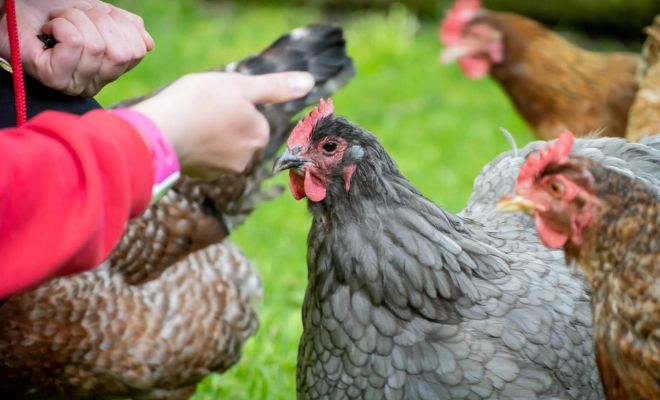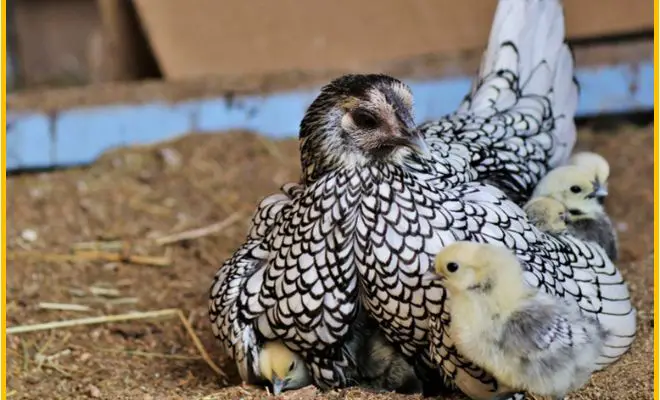Learn How to Teach Chickens to Come When Called! (10 Easy Tips!)

Ever dream of your chickens happily trotting over when you call? Can chickens be trained to come when called? Well, it’s possible! When your chickens respond to your call, you can quickly gather them for treats, health checks, or to secure them for the night.
Now the question is, how and why are teaching chickens to come when called? Chickens love treats! Use this to train them. Call them with a specific word (like “chick, chick, chick!”) and immediately give them a treat when they come. Repeat in the same spot, then slowly increase the distance. Soon, they’ll start to respond to your call.
Want to know the benefits of teaching chickens to come anytime you call? Let’s mention some benefits to encourage you more about training chickens!
Table of Contents
Teaching Chickens to Come When Called: How Do You Train?
About to train chickens to come when you call them? Understand their behavior first.
Besides, Choose a quiet, contained area for training. Also, pick something irresistible but healthy (mealworms, sunflower seeds, etc.). These things will be your initial steps!
Now comes the main points of training!
- Start Training at a Young Age: It’s easier to train chickens when young, ideally between 4-8 weeks old. Chickens imprint on their environment and learn behaviors more readily during this critical period.
- Choose a Distinct Call or Whistle: Select a unique sound that you’ll use consistently to call your chickens. A simple whistle or a repetitive phrase like “Here chick, chick, chick” can work well. A bell can also help them respond to you!
- Introduce the Call with Treats: Begin by calling your chickens and immediately offering them a tasty treat, such as cracked corn, scratch grains, seeds, mealworms, or chopped fruits and vegetables. This will create a positive association between the call and the reward.

- Be Consistent: Use the same call or whistle every time you want to gather your chickens, and always provide a treat when they come. Consistency is key to reinforcing the desired behavior.
- Start Close and Gradually Increase Distance: Initially, call your chickens when they’re close by, and reward them immediately when they come to you. As they learn the association, gradually increase the distance from which you call them.
- Practice at Different Times and Locations: To solidify the behavior, practice calling your chickens at different times of the day and in various locations within their familiar environment. This will help them generalize their response to different situations.
- Be Patient and Persistent: Training chickens can take time and patience. Some chickens may learn more quickly than others, but with consistent practice, most chickens will eventually associate the call with the reward and come when called.
- Reinforce the Behavior: Even after your chickens have learned to come when called, continue to reinforce the behavior periodically with treats. This will help maintain the desired response over time.
- Consider Individual Differences: Some chickens may be more food-motivated than others, so you may need to experiment with different treats to find the most effective reward for each bird.
- Use Positive Reinforcement: Avoid punishing or scolding your chickens if they don’t come when called. Positive reinforcement with treats and praise is more effective than negative reinforcement for training chickens.
Bonus Tip: Training them 2 to 3 times each day can be helpful enough.
How to Train Multiple Flocks to Come When You Call?
Training multiple flocks requires a slightly different approach than training a single flock. Here’s what you need to consider:
- Use Different Calls for Each Flock: Pick a distinct whistle or phrase for each flock (e.g. “Flock 1,” “Flock 2,” etc.).
- Train Flocks Separately at First: Start by training each flock individually with their assigned call and treats. Get each flock responding well to their own call before combining.
- Gradually Introduce Flocks Together: Once flocks know their calls, have training sessions with multiple flocks present. Call and treat one flock at a time while others watch and learn.
- Use Visual Cues Too: Pair each flock’s call with a visual cue like a colored bucket or flag. Visual and audio cues together can help chickens distinguish.
- Be Consistent: Always use the same call/cue for each flock. Reward the right flock when they respond correctly.
- Change Locations: Train in different areas so flocks generalize the calls everywhere.
- Be Patient: It takes more time to train multiple flocks. Keep practicing and rewarding the desired behavior.
- Watch Flock Dynamics: Adjust if you see bullying or social hierarchies interfering with training.
Check out this video to learn more about teaching chickens to come.
Pro Tips and Facing Challenges When Training Chicken to Come
Sometimes our feathered friends don’t respond right away. Here are some common challenges and pro tips to overcome them.
Challenge: Shy Chickies
Feeling Scared? If your chickens seem nervous, start training in a quiet, familiar spot. Don’t get too close at first, gradually move closer as they get comfy.
Challenge: Treat Snobs
Treat Time Tune-Up! Maybe your chickens are tired of the usual treats. Try switching it up with something extra yummy like mealworms or chopped fruit!
Challenge: Distraction Station
Focus, Flock! Training in a quiet area is great at first, but slowly add distractions like toys or other chickens. This helps them learn to come when called, even with temptations around.
11 Pro Tips to Train Chickens to Come When You Call
Check out the list of pro tips to teach chickens.
- Minimize outside noise/movement.
- End session if flock loses focus.
- Don’t train after free-ranging.
- Try higher-value treats.
- Clicker training to mark behavior.
- Train one-on-one first before adding to the flock.
- Let leader hens master it, and others will follow.
- Spend more time with younger/shy ones.
- Consider separating flocks temporarily.
- Reintroduce cue with new coops/feeders, etc.
- Start shorter distances when changing things up.
The Benefits of Well-Trained Chickens
There are a lot of benefits to training chickens to respond to your call. So, I am listing some of the benefits below-
Easy Gathering:
- Call flock instead of chasing
- Helpful for moving coops, catching strays
- Checks health/collects eggs much easier
Better Bond:
- Training creates trust and bonding
- Tamer, friendlier pet chickens
- Safe for kids to interact
Free-Range Possible:
- Can free-range while keeping contained
- Call them back before roaming too far
- Avoid neighbor conflicts
Secure from Predators:
- Call flock into secure coop/run
- Prevent losses to hawks, raccoons
- Especially crucial at dusk
Flock Stays Together:
- Responds as a group to your calls
- No stragglers left behind
- Stronger flocking behavior
Easier Management:
- Quick to gather for catch/transport
- Can direct where they forage/dust bathe
- Simpler if multiple flocks
Related Articles:
FAQs
Here are some related queries that’ll help you know about training chickens to come.
Q. How do you train a chicken to know its name?
Use treats and say their name as they eat. Repeat often to build the connection.
Q. How do you train chickens to return to the coop?
Train them to come when called with treats. Lure them towards the coop at the end.
Q. Do chickens recognize your voice?
Yes, chickens can distinguish your voice from others. It’s especially true if you spend a lot of time with them.
Q. Can chickens remember faces?
While research isn’t conclusive, chickens likely recognize familiar faces to some degree.
Q. Why is my chicken so talkative?
Chickens are naturally vocal creatures! They chat with each other about food, danger, and keeping track of the flock.
Final Word
Teaching your chickens to come when called isn’t just about convenience. It’s about building a special connection with your feathered buddies. By sticking to it with patience and the right methods, you’ll be happy with the bonding! It’s what I felt when taught them to come when I call!
I would say embrace smoother management and safe interactions. Ready to dive in? Start today and watch as your chickens eagerly respond to your call!






